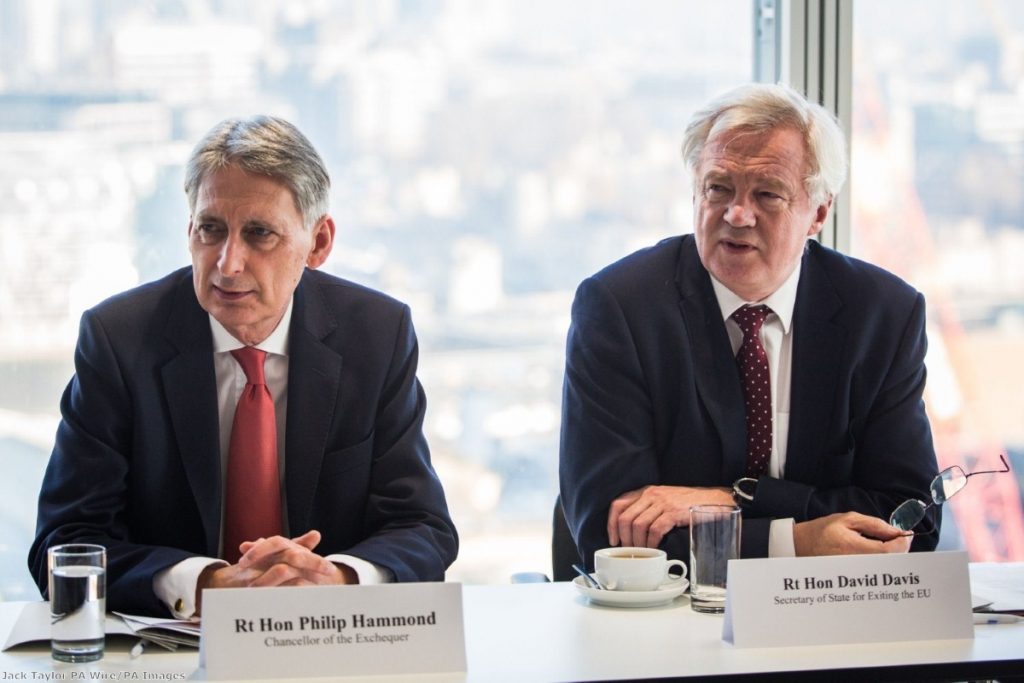Philip Hammond's newfound career as the Che Guevara of Brexit, fighting a valiant guerilla campaign against the Cabinet headbangers, appears to have ended. The chancellor wrote a joint op-ed with Liam Fox in yesterday's Sunday Telegraph, like a man at a political show trial forced to renounce his beliefs, ruling out a smooth transition.
"We are both clear that during [the transition] the UK will be outside the single market and outside the customs union and will be a 'third-country' not party to EU treaties," it read.
Hammond is now signed up to Year Zero Brexit, where Britain claims to be able to deliver a system-wide customs, immigration and regulatory infrastructure, the specifics of which have not been established, in 18 months.
Of course, it can't do this. The buildings haven't been leased, the staff haven't been hired, the training hasn't even been devised, let alone implemented. And indeed none of it can start, because we do not know what will be required, for the simple reason that it hasn't been negotiated yet. It is a basic matter of chronology. We are back in the now traditional routine of demanding the earth while doing nothing to secure it, like someone watching daytime TV and guzzling beer while shouting at their neighbours that they're Alexander the Great.


The reality of the situation is this: A transitional deal outside the single market and the customs union is not a transition deal. It is an end-state deal. There is no time to negotiate it, let alone set up the infrastructure that is required of it. The whole point of transition is to allow the time for that to happen.

The quality of those Hammond has thrown his lot in with was on display today when Tory backbencher Bernard Jenkin went on the Today programme to say how wonderful it was that the chancellor had seen the light. What followed was a sustained demonstration of intellectual bankruptcy.
Jenkin said:
"If there is a ghastly cliff edge because the European Union really does plan to ground our aircraft and check every lorry entering the European Union through the Channel Tunnel, it would be pretty destructive and stupid, wouldn't it?"
The cliff edge is not a punishment. It is the default outcome of falling out of the EU with no deal. Transition is intended to create time for that agreement to be secured. This is so simple it really shouldn't need explaining, but you can't rely on a legal agreement unless it exists. Jenkin perceives the world like some kind of Harry Potter regulatory wonderland, where legal agreements come into existence in a puff of smoke without needing anyone to secure them nor any time in which to do so.
He does not seem to understand that the cliff edge is a result of Britain not having organised the regulators, customs check points or immigration systems in order to take on the workload that he is demanding. Instead, his own failure of preparation or awareness is presented as a punishment by the EU.
He went on:
"Why wouldn't they afford us the same customs facilitation agreements and aviation agreements they have with hundreds of other countries?"
This is a fascinating moment. Securing that type of arrangement is precisely the object of talks. The purpose of the transition is to give negotiators time to establish it. He is at this stage denying the need for transition by relying on the very thing which makes it necessary.
The extent to which his brain is riddled with double-think is demonstrated later in the interview, when he insists that world trade is putting Europe in the shade, meaning Britain needs to get out the customs union and spread its wings. At no point does he realise that by leaving the single market and customs union we also lose access to the "customs facilitation agreements" it has with other countries. Indeed, our attempt to secure continued access to these agreements is one of the many reasons why Brexit talks will go on past March 2019.
The rest of the interview descends into conspiracy theory nonsense about Europe punishing us, with the only evidence being the failure of preparation on the British side which he is himself promoting. It's not even really a political argument. It is the anguished cry of a child which does not really know what it wants except that it definitely really, really wants something. And these are the people Hammond has gotten into bed with. We are now, once again, hurtling towards the cliff edge, foot down on the accelerator pedal, blindfolded by our own mania.
Ian Dunt is the editor of Politics.co.uk. His book – Brexit: What The Hell Happens Now? – is available now from Canbury Press.
The opinions in politics.co.uk's Comment and Analysis section are those of the author and are no reflection of the views of the website or its owners.









